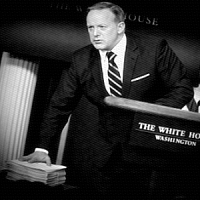#theUnion | #WhatTheyVotedAgainst
It is so easy to miss these little moments amid the cacophony. Steve Benen brought us this episode, eariler this month:
 Apparently, the point is that the Republicans’ proposal, panned by practically everyone who isn’t an elected GOP official, is better – because it’s shorter. This was Spicer’s exact quote to reporters:
Apparently, the point is that the Republicans’ proposal, panned by practically everyone who isn’t an elected GOP official, is better – because it’s shorter. This was Spicer’s exact quote to reporters:
“People who have concerns about this, especially on the right, look at the size. This [puts hand on tall pile of paper] is the Democrats’; this [puts hand on short pile of paper] is us. There is, you can’t get any clearer, in terms of this [puts hand on tall pile of paper] is government; this [puts hand on short pile of paper] is not.”
Please note, this wasn’t a joke. Spicer wasn’t kidding around. In 2017, the chief spokesperson for the president of the world’s dominant superpower argued, in all seriousness, that the merit of a national health care plan can be measured in part by page numbers.
There really is something to the idea that the presidency of Donald Trump marks the arrival proper of internet culture in American society; usually this point takes the form of reflections on trolling, flaming, and people who like lulz. This is different. This has something to do with an idea called Poe’s Law, which pertains to the written word and, for instance, emoticons. The idea is that there arises a threshold at which, without some manner of hint or cue, it becomes impossible to discern ‘twixt satire and genuine representation. White House Press Secretary Sean Spicer trying to illustrate the difference between the Republican agenda for government and actual government slouches toward this dark and nebulous quarter.
____________________
Image note: White House Press Secretary attempts to demonstrate the difference between government and the Republican health care agenda during a daily press briefing at the White House in Washington, D.C., 7 March 2017. (Photo: Carlos Barria/Reuters)
Benen, Steve. “By pointing to piles of paper, Spicer makes the worst argument of all”. msnbc. 7 March 2017.
